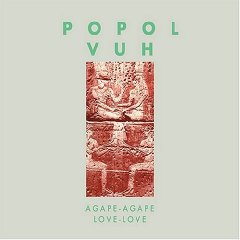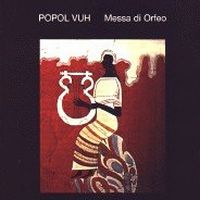The Ave Maria is a traditional Christian prayer addressing Mary, mother of Jesus.
Popol Vuh were a German musical collective founded by keyboardist Florian Fricke in 1969 together with Frank Fiedler, Holger Trülzsch (percussion), and Bettina Fricke. Other important members during the next two decades included Djong Yun, Renate Knaup, Conny Veit, Daniel Fichelscher, Klaus Wiese, and Robert Eliscu. The band took its name from the Mayan manuscript containing the mythology of highland Guatemala's K'iche' people.
Daniel "Danny" Secundus Fichelscher,, is a German multi-instrumentalist who played a pivotal role in Krautrock band Popol Vuh, was a member of the German group Gila and is currently Amon Düül II's drummer. Fichelscher is the son of jazz pianist and singer Toby Fichelscher.

Florian Fricke (1944–2001) was a German musician who started his professional career with electronic music, using the Moog synthesizer, and was a founding member of the German rock group Popol Vuh.

Aguirre is the seventh album by German band Popol Vuh. It contains music used in the soundtrack to Werner Herzog's film Aguirre, the Wrath of God (1972), first released as an album in 1975 on Ohr, and reissued in 2004 by SPV with one bonus track. This score was the first of many filmic collaborations between the group and Herzog. Only two tracks are from the film; the rest were gathered from various recordings done by the group during the period 1972–74, including alternative versions of two songs originally released on the band's 1974 album, Einsjäger und Siebenjäger.

Affenstunde is the first album by German band Popol Vuh. Originally released in 1970 in Germany by Liberty Records, it has been reissued several times by various international labels. The 2004 German SPV edition features one previously unreleased bonus track. It is a notable early example of the Moog synthesizer being used for the production and composition of original music.

In den Gärten Pharaos is the second album by German band Popol Vuh, released in 1971 by record label Pilz.

Seligpreisung is the fourth album by German band Popol Vuh. It was originally released in 1973 on record label Kosmische Musik. The title is the German name for the Beatitudes, from Christ's Sermon on the Mount.

Einsjäger und Siebenjäger is the fifth album by Popol Vuh. It was originally released in 1974 on Kosmische Musik. In 2004 SPV re-released the album with two bonus tracks. "Wo bist Du?" was originally released on Popol Vuh's album Die Nacht der Seele as "Wo bist Du, der Du überwunden hast?".

Das Hohelied Salomos is the sixth album by Popol Vuh. It was originally released in 1975, on United Artists Records. In 2005, SPV re-released the album with three bonus tracks.

Letzte Tage – Letzte Nächte is the eighth album by Popol Vuh. It was originally released in 1976 on United Artists Records. In 2005 SPV re-released the album with three bonus tracks.

Nosferatu is the eleventh album by Popol Vuh and was released as the original motion picture soundtrack of Nosferatu: Phantom der Nacht by director Werner Herzog. It was originally released in 1978. In 2004 SPV re-released the album with a slightly different track list and adding four tracks originally released on the Popol Vuh album Brüder des Schattens – Söhne des Lichts.

Die Nacht der Seele is the twelfth album by Popol Vuh. It was originally released in 1979 on Brain Records. In 2005 SPV re-released the album with four bonus tracks. "Engel der Luft" and "Im Reich der Schatten" were used in 1982 for the soundtrack of Werner Herzog's film Fitzcarraldo.

Agape – Agape / Love – Love is the fourteenth album by Popol Vuh. It was originally released in 1983 on Uniton. In 2004 SPV re-released the album with one bonus track.

Spirit of Peace is the fifteenth album by Popol Vuh. It was originally released in 1985 on Cicada. The first track was used by Werner Herzog as original motion picture soundtrack for his documentary The Dark Glow of the Mountains about Reinhold Messner.

For You and Me is the seventeenth album by Popol Vuh. It was originally released in 1991 on Milan Records. In 2006 SPV re-released the album with one bonus track.

City Raga is the eighteenth album by Popol Vuh. It was originally released in 1995 on Milan Records.

Messa di Orfeo is the twentieth and last album by Popol Vuh. It was originally released in 1999 on Spalax and features music played during an audio-video-light installation as performed in the Labyrinth of Molfetta, Bari, during the Time Zones Festival in 1998.
Pilz was a German record label, set up in Berlin in 1971 by German music mogul Rolf-Ulrich Kaiser, who also established the label Ohr.
Wolf Conrad "Conny" Veit was a German musician, singer, composer and painter, best known for his appearances in Gila and Popol Vuh. His main instrument was the guitar. His name was misspelled "Conny Veidt" in Gila's first album.















